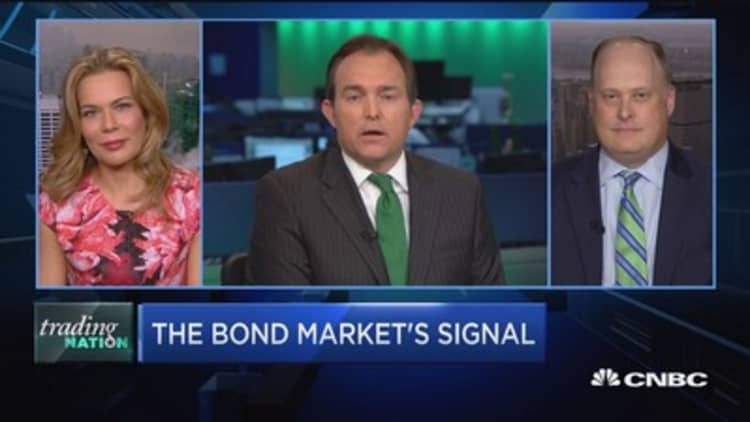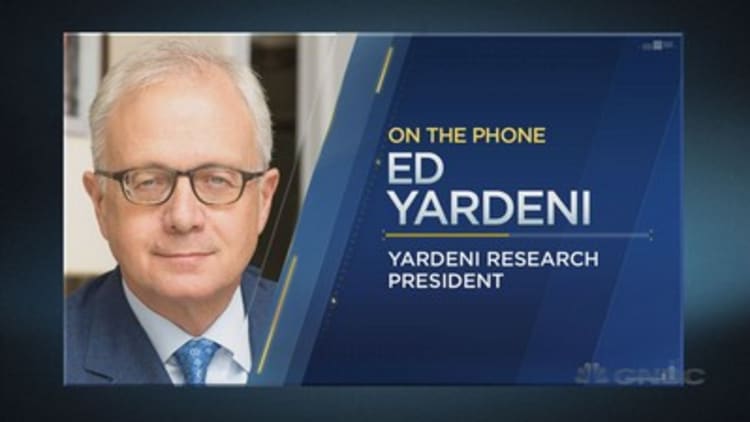
Bond yields have sunk lately, which could suggest trepidation about the U.S. economy.
Although the Federal Reserve remains firmly in hiking mode, raising its federal funds rate target already and indicating it will likely do so twice more this year, the 10-year U.S. Treasury yield is falling. Some strategists say the cause lies in shifting investor sentiment surrounding fading "Trump trades" and a renewed set of expectations around economic growth.
On Tuesday, the 10-year yield fell to 2.31 percent, its lowest level since the last week of February.
"It seems that the bond market just hasn't really bought into the idea that inflation is coming back, or that economic growth is going to be surprisingly strong," Yardeni Research president Ed Yardeni said Tuesday in an interview on CNBC's "Trading Nation." "The stock market seems to be more attuned to that kind of growth."
When asked about what might be making bond investors wary, Yardeni pointed to recent weak economic data such as reports of distressed brick-and-mortar retail, along with weak March car sales.

"After the election, a lot of people started to revise their GDP numbers up, figuring fiscal policy was coming, in terms of infrastructure spending and tax cuts. And I think now we're getting a little dose of reality, and realizing it's going to take a while to see all that unfold. Meanwhile, the economy hasn't changed radically since the election," so "we're not seeing it in the hard data."
Rising inflation expectations generally translate to rising rates; as money becomes less valuable over time, investors need to receive more of it in the future.
That said, there are some signs that inflation is rising. Purchasing Managers' Index data published Monday "certainly supports the notion that price pressures are rising and the labor market is tightening," Win Thin, global head of emerging market currency strategy at Brown Brothers Harriman, wrote Tuesday in a note to clients.
"After the PMI data, one would think that the 10-year yield would be closer to 2.5% than to 2.3%, and yet here we are at 2.33%, the lowest since February 24," Thin observed, adding that signs are also pointing to a strong non-farm payroll number on Friday.
"Investors had higher expectations of [U.S.] economic growth thanks to promises of infrastructure spending, corporate tax reform and other measures. The recent failures, including healthcare changes, has reset investors' expectations as to how much growth and change can be achieved," Erin Gibbs of S&P Global wrote to CNBC in an email Tuesday, referring to the recent failure of the proposed health-care bill.
Another reason for falling yields can be found in global pressures depressing longer-term rates in the U.S., as longer-term debt offers more stability in terms of fixed income, along with attractive yields than many other developed markets, Gibbs added.
"It seems it's just the added hope of additional growth from political changes," pushing the 10-year yield down, Gibbs said.
On a technical level, 10-year yields have been range-bound between roughly 2.3 percent and 2.6 percent, commented Piper Jaffray's Craig Johnson. And the shifting of investor sentiment surely appears to be behind this, along with political uncertainty in Europe.
"We've got kind of a re-setting of expectations that are happening right now. We didn't see the health-care bill get put through, the Fed has raised rates, brought up the shorter end of the curve, but we haven't seen those inflation expectations accelerate, due to some of the challenges in Washington," Johnson said Tuesday on CNBC's "Power Lunch."
But Johnson believes yields are simply consolidating right now, and the 10-year yield will rise to between 3 percent and 3.25 percent by year-end.
By Tuesday's market close, the U.S. 10-year yield was slightly higher, at 2.364 percent.





